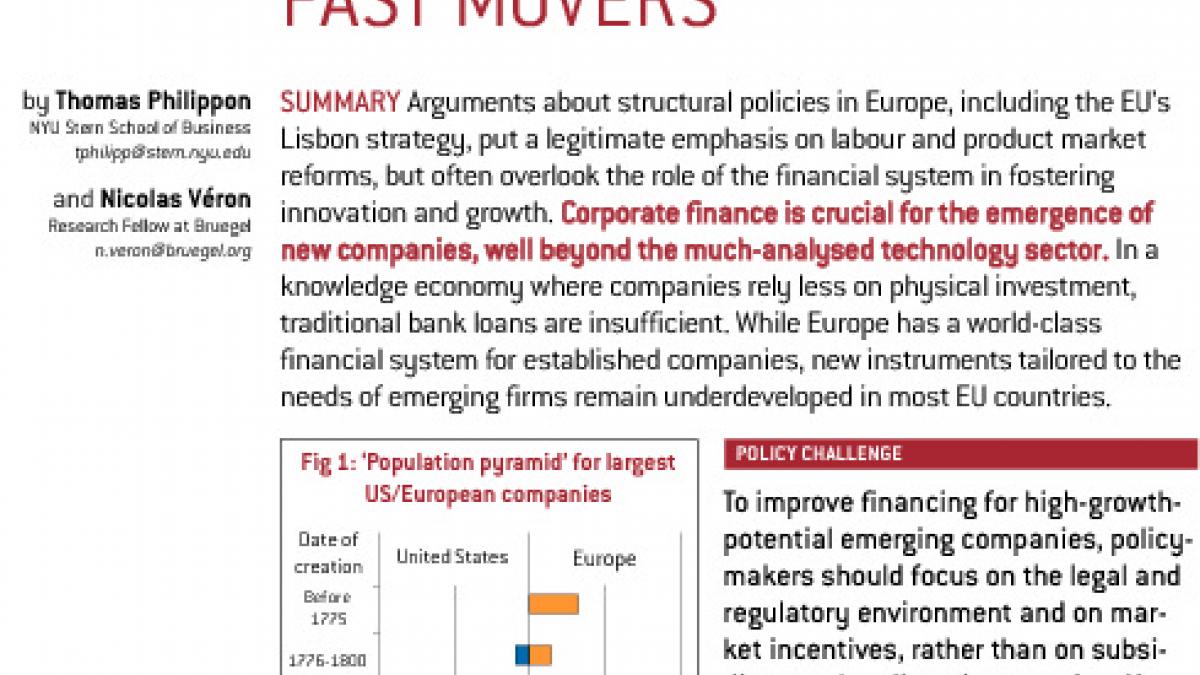- / Home
- / Publications
Financing Europe's fast movers
- Publishing date
- 20 January 2008
- Authors
- Nicolas Véron Thomas Philippon

This policy brief deals with the link between corporate finance and growth. The discussions about structural reform in Europe, including the EUs Lisbon strategy, put a legitimate emphasis on labour and product market reforms, but often overlook the role of the financial system in fostering expansion. Thomas Philippon and Nicolas Véron analyse this gap and outline a number of possible policy responses.
About the authors
-
Nicolas Véron
Nicolas Véron is a senior fellow at Bruegel and at the Peterson Institute for International Economics in Washington, DC. His research is mostly about financial systems and financial reform around the world, including global financial regulatory initiatives and current developments in the European Union. He was a cofounder of Bruegel starting in 2002, initially focusing on Bruegel’s design, operational start-up and development, then on policy research since 2006-07. He joined the Peterson Institute in 2009 and divides his time between the US and Europe.
Véron has authored or co-authored numerous policy papers that include banking supervision and crisis management, financial reporting, the Eurozone policy framework, and economic nationalism. He has testified repeatedly in front of committees of the European Parliament, national parliaments in several EU member states, and US Congress. His publications also include Smoke & Mirrors, Inc.: Accounting for Capitalism, a book on accounting standards and practices (Cornell University Press, 2006), and several books in French.
His prior experience includes working for Saint-Gobain in Berlin and Rothschilds in Paris in the early 1990s; economic aide to the Prefect in Lille (1995-97); corporate adviser to France’s Labour Minister (1997-2000); and chief financial officer of MultiMania / Lycos France, a publicly-listed online media company (2000-2002). From 2002 to 2009 he also operated an independent Paris-based financial consultancy.
Véron is a board member of the derivatives arm (Global Trade Repository) of the Depositary Trust and Clearing Corporation (DTCC), a financial infrastructure company that operates globally on a not-for-profit basis. A French citizen born in 1971, he has a quantitative background as a graduate from Ecole Polytechnique (1992) and Ecole Nationale Supérieure des Mines de Paris (1995). He is trilingual in English, French and Spanish, and has fluent understanding of German and Italian.
In September 2012, Bloomberg Markets included Véron in its second annual 50 Most Influential list with reference to his early advocacy of European banking union.
-
Thomas Philippon
Thomas Philippon is Professor of Finance at New York University, Stern School of Business. Philippon was named one of the “top 25 economists under 45” by the IMF in 2014. He also won the 2013 Bernácer Prize for Best European Economist under 40, the 2010 Michael Brennan & BlackRock Award, the 2009 Prize for Best Young French Economist, and the 2008 Brattle Prize for the best paper in Corporate Finance. He was elected Global Economic Fellow in 2009 by the Kiel Institute for the World Economy.
Philippon has studied various topics in macroeconomics and finance: systemic risk, crisis resolution mechanisms, the dynamics of corporate investment and household debt, and the size of the finance industry. His recent work has focused on the Eurozone crisis and on financial regulation. He currently serves on the Monetary Policy Advisory Panel of the Federal Reserve Bank of New York, and as a board member and director of the scientific committee of ACPR, the French prudential regulator of banks and insurance companies. From 2012 to 2013, he was the Senior Economic Advisor to the French Finance Minister.
Philippon graduated from Ecole Polytechnique, received a PhD in Economics from MIT, and joined New York University in 2003.
- Language
- English
Related content

European capital markets union: make it or break it
Capital markets union has not delivered, but it should be given a last chance, with a focus on supervisory integration

The European Union should do better than confiscate Russia’s reserve money
The EU can use interest income made on immobilised Russian reserve assets to support Ukraine, but confiscating the assets now would be a mistake

The European Union must be Ukraine's wartime financier of last resort
